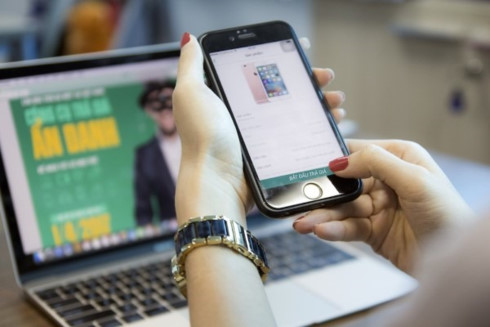|
Mobile commerce fails to take off with Vietnamese consumers
Millions of Vietnamese use
smartphones for tasks like listening to music, making a phone call, sending
text messages, hailing a taxi or checking in for a flight, says the Ministry
of Industry and Trade.

But hardly anyone uses their mobiles
for buying something at a store, Do Thang Hai, deputy minister of the MOIT told
an audience at a recent conference in Hanoi discussing the lack of
development of mobile commerce in the country.
Mobile payment systems are not
likely to replace traditional wallets anytime soon in Vietnam, said Mr Hai.
Such systems are pretty much just a
tech entrepreneur’s fantasy, he noted, as most consumers are not familiar
with them and those that are- see absolutely no benefit from their use.
The numbers speak volumes, said Mr
Hai.
With an estimated 60 million
smartphone users throughout the country, the total volume of sales using
mobile payments, or m-commerce as it is most often referred to, amounted to
just US$900 million.
For comparison purposes, in 2014,
m-commerce sales reached US$11.51 billion in the Republic of Korea with a
total of 67.5million smartphone users. M-commerce sales in the ROK are
forecast to reach US$29 billion by 2019 with a total of 71 million smartphone
users.
Clearly, this does not mean that
m-commerce won’t ever take off in Vietnam, noted Mr Hai. It just means
that m-commerce is not going to revolutionize shopping in the country anytime
soon.
Most likely it will just evolve over
the next couple of decades ang gradually find its way as an alternative sales
channel, he added.
Le Thi Ha from the Department of
E-commerce and Information Technology in turn said developing a mobile
payment system together with improving the trust of consumers was critical to
the development of m-commerce in Vietnam.
At one time, there was an assumption
by many that m-commerce was just going to explode in the marketplace in
Vietnam and become a mainstream sales channel in concert with a revolutionary
transformation to a more modern mobile payment system utilizing applications
such as Google Wallet.
But that didn’t happen, said Ms Ha,
largely because people do not mind paying with cash or a credit card. In
fact, she noted that a recent survey of companies in Vietnam revealed that
only 25% of them accept online payments.
In other words, three out of every
four vendors that offer online sales only accept cash on delivery as the
payment method. If a consumer wants to pay by credit card they are
forced to go the store to make payment.
None of the companies surveyed had
found a winning combination to transform mobile payments into everyday
consumer behaviour.
As the digital payment world stands
now in Vietnam, consumers who want to buy things with a phone must first find
a business that supports the technology, and then figure out which smartphone
technology the store accepts.
Which is usually cash upon delivery.
Phan The Thang from the Vietnam
Competition Authority said that first and foremost the country needs to get a
mainstream digital payment solution started, which is a bit of a catch-22.
More consumers would most likely use
such a service if it were widely available, he said, but merchants are not
interested in installing new payment software and hardware unless a large
swath of shoppers are already using the service.
But even if the payment process were
widely available, companies still would need to persuade consumers that there
was an advantage to making payments from a phone versus by cash or credit
card.
The most logical approach, he said,
is for companies to offer cash incentives that they do not offer for cash or
credit cards for consumers who purchase by phone and pay using an electronic
wallet service.
As more consumers use the service
they will find that it is a better alternative to pay by using a mobile
payment system because of the savings and the convenience of not having to
deal with cash or credit cards.
Instituting a good mobile payments
application universally throughout the country that gains the confidence of
both the consumer and retailer is the solution to unlocking the door to
m-commerce, Mr Thang underscored.
But until that happens, don’t expect
m-commerce to take off with Vietnamese consumers.
VOV
|
Thứ Năm, 21 tháng 9, 2017
Đăng ký:
Đăng Nhận xét (Atom)
Không có nhận xét nào:
Đăng nhận xét